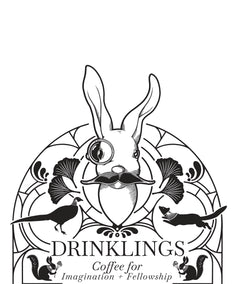Diversity is NOT the opposite of Unity
As many of our customers are aware, we at Drinklings' actually have full lives outside of what we do here. We both took the advice of wise individual's around us and have made Drinklings' a side project until it can be sustainable on its own, which of course provides numerous hiccups in operations--on that front, we genuinely want to say thank you for those that follow us and bear with those hiccups. But it also means we attend to our other jobs and responsibilities and one of those responsibilities for myself (Randy) is on-going work in an MSW (Masters of Social Work) course. The post below comes off of recent engagement with the topic of identity and diversity. (In the off chance that the professor in question actually reads this, do know this is my continued approach to processing my own thoughts and convictions--it's how I roll).
Over the past several months I have been giving a great deal of thought to the topic of unity and diversity. Yesterday, in my on-going MSW (Masters of Social Work) coursework, we were given the assignment to produce an identity statement and were given examples of identity formation based on characteristics. The aim was well-intentioned: if you know who you are and you know this with security, you'll have a better approach towards understanding how other identities are shaped and can participate in celebrating them. So we were instructed to start the sentence "I am_____" and finish it out with a list of descriptions.
My initial training was in philosophy and theology and so that generally means that when I am asked to do an assignment I become "that guy." Trust me, I actually hate being "that guy" most of the time (and most of the time, I choose not to be "that guy"). Really, I know it's obnoxious, but there was such a significant inner conflict that I genuinely felt incapable of doing the assignment according to the prescribed directions.
If I were to finish this sentence according to the assignment it would have read something like "I am a white, lower-middle class, protestant (sometimes), young (comparatively), male, father, husband, widower, pastor, coffee roaster, social worker, etc. etc. etc. etc. etc." and I could probably list thirty other descriptors, half of which would be qualified in some measure. And for me, would any of that be helpful? Not really. No.
It's not that it's bad to know, recognize, or even emphasize certain characteristics about oneself involving demographical and descriptive data. But as followers of the redemptive way it becomes very difficult to begin a sentence with "I am" and then follow it up with a huge list of demographic, diagnostic, and descriptive language. Racial Identity Theory and other theories of identity formation make an emphasis on characteristics that define oneself in contrast with the other (e.g. "I am black and not white"; "I am female and not male"). I think that there is a lot of use to this, namely, that (in line with RiT) it teaches individuals that they shouldn't feel shamed or belittled because of things like race, ethnicity, religion, orientation, etc. Trust me, our culture has enough stereotypes on the way that white people should act white and black people should act black and so forth and it leaves open all sorts of problems when a particular race or ethnicity seems to be assimilating to the other. We do need to stop with the whole 'races/ethnic groups/genders' are should operate a certain way.
But behind all descriptions is the notion of "the silent adjective." What do I mean?
In middle school English classes, individuals are taught about the "Hidden 'I am'" of sentences.
What are you doing today?
(I am) Going to the park?
What are you wearing tomorrow?
(I am going to wear) pink.
The same holds true for descriptors. If I am going to give myself a set of descriptions as a basis of identity like "I am white, I am male" there are a lot of assumptions that come with those descriptors and they can either be shameful ("I am Mexican, but I wish I was white") and they can equally be discriminatory ("I am Protestant and to Hell with those Catholics!). Descriptions can be helpful, but they are often divisive because we tend to attach underlying value assumptions to each of them. We need something better at the absolute center of identity formation.
And so in doing this assignment, my mind kept going back to Acts 15 and the Gospel's insistence that in the Kingdom there should be "neither Jew nor Greek" (Gal 3.28). I thought it ironic that at a university in which we are identified as "Christian Social Workers" that identity was being taught around descriptions: "I am x first, and THEN I am neither Jew nor Gentile, etc." One approach to identity was primary; one approach to identity was secondary and/or optional. This assignment (well-intentioned as it was) suggested we should downplay the radical importance of this proclamation--to demarcate it as a "spiritual matter", yet as I have come to believe over many years, everything is spiritual and the radicality of redemption doesn't stop where programs or social services or strategies or trainings begin. If it is as simple as saying "there is neither Jew nor Gentile" then it is that simple. Every other approach must fall in line under that proclamation!
Now, don't get me wrong. We live in a real world in which descriptions are real and pragmatic and objective. If you are from India and I am from the Deep South, we're obviously going to have our differences in culture, custom, traditions, beliefs, etc. BUT, the question is whether our diversity comes before our unity or our unity comes before our diversity. Which approach is primary? Which one stands at the essential center of our identity and which one is descriptive. If we make primary highlighting our own distinctiveness, we may find a positive identity but we also run the very real risk of attaching hidden adjectives that continue to separate one from another. But if we make primary our unity, not only will we be able to utilize descriptive attributes responsibly without such hidden adjectives, but we will find bridges and celebrations of ourselves and each other where we never before could!
The question I am asking is when we begin with a sentence of 'Who Am I?' should our first response be descriptive or should it be based on something much deeper, more universal, and categorically unifying? As has been said before, unity is not the opposite of diversity. It's a question I am still wrestling with but one I think worth asking at this time. So far, the redemptive path has not failed to point in the right direction, both for myself and (where applied genuinely) the world.




